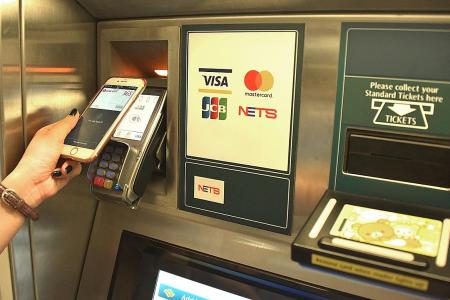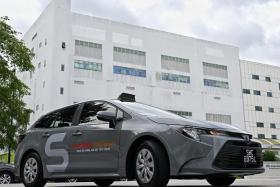Cash top-ups at MRT passenger service centres to be phased out
The service will be phased out completely next month
Cash top-up services at passenger service centres of train stations will be phased out next month, completing the first step by the authorities in a drive to wean commuters off cash when paying for public transport.
This will mean that cash-paying commuters may no longer rely on the service centre workers at the stations to help them reload their stored-value travel cards.
Instead, they will have to use self-help ticketing machines.
Since last September, MRT stations have progressively stopped allowing cash top-up services at the centres, kick-starting the Government's quest to have a fully cashless public transport system by 2020.
So far, 89 stations have discontinued the service, and on Wednesday, another 24 stations - including Orchard, Somerset, Raffles Place, Bugis and Aljunied - will do likewise.
The remaining 25 stations on the MRT network, including Chinatown, Eunos, Tampines and Jalan Besar, will follow suit on March 21.
POOL
A TransitLink spokesman told The Straits Times it has a pool of more than 150 service agents who will be deployed for up to two months at the affected stations to help commuters use the ticketing machines.
TransitLink said there is at least one service agent at each station, between 8am and 8pm daily, and it will deploy more workers during peak periods.
By 2020, all ticketing machines at train stations will accept top-ups only via electronic methods, such as by using Nets or debit and credit cards. Buses will also stop accepting cash payments by then.
The authorities have given the assurance that cash can continue to be used at convenience stores and TransitLink ticket offices to top up travel cards.
Some are concerned that the drive to go cashless could lead to certain segments of commuters being left behind, such as the elderly.
Mr Rahmat Mawa, 71, said he once mistakenly added $50 to his travel card because he thought the machine would return change. "Now, I have to make sure I prepare small change," said the part-time landscaper and cleaner.
Retiree P.K. Low, 71, said: "Now, we have no choice but to learn how to use the machines.
"It is not difficult, but there were times I took the card away from the reader too soon, before the transaction was done."
Other commuters such as Madam Tan Bao Di, 73, have turned to topping up their travel cards at convenience stores as the workers there handle the transaction for them.
"The (TransitLink) staff showed me how to use the ticketing machine. But I have forgotten the steps as they are complicated," she said.
Convenience stores impose a 50-cent fee for each top-up transaction, but Madam Tan, who used to work in the hotel industry, said she is resigned to paying the levy.
A 7-Eleven spokesman said there are an average of 180,000 of such transactions a month made at its stores, with no noticeable increase since MRT stations removed cash top-ups at the passenger service centres.
But FairPrice, which runs the Cheers convenience store chain, said it saw an increase of about 5 per cent in monthly ez-link card top-up transactions at Cheers outlets from September to December last year.
FairPrice added that it would review the surcharge.
"As a responsible retailer, Cheers is currently reviewing our ez-link card top-up services and charges to better serve the interest of our customers and the community," it said.
Get The New Paper on your phone with the free TNP app. Download from the Apple App Store or Google Play Store now



